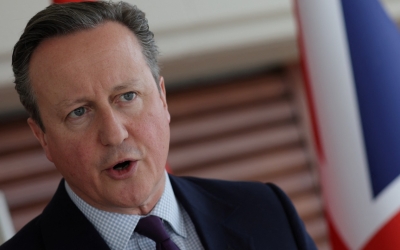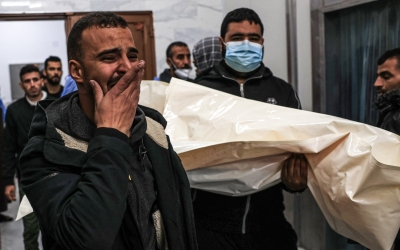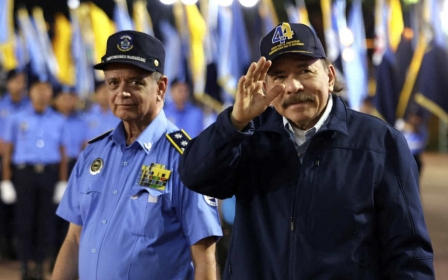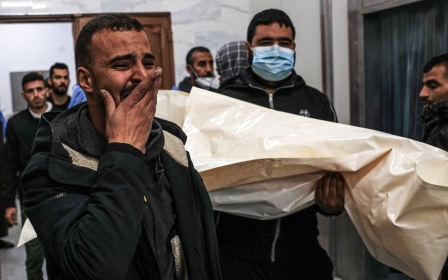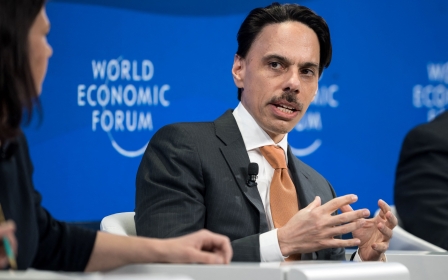Saudi Arabia defies claims it will normalise with Israel before Gaza ceasefire
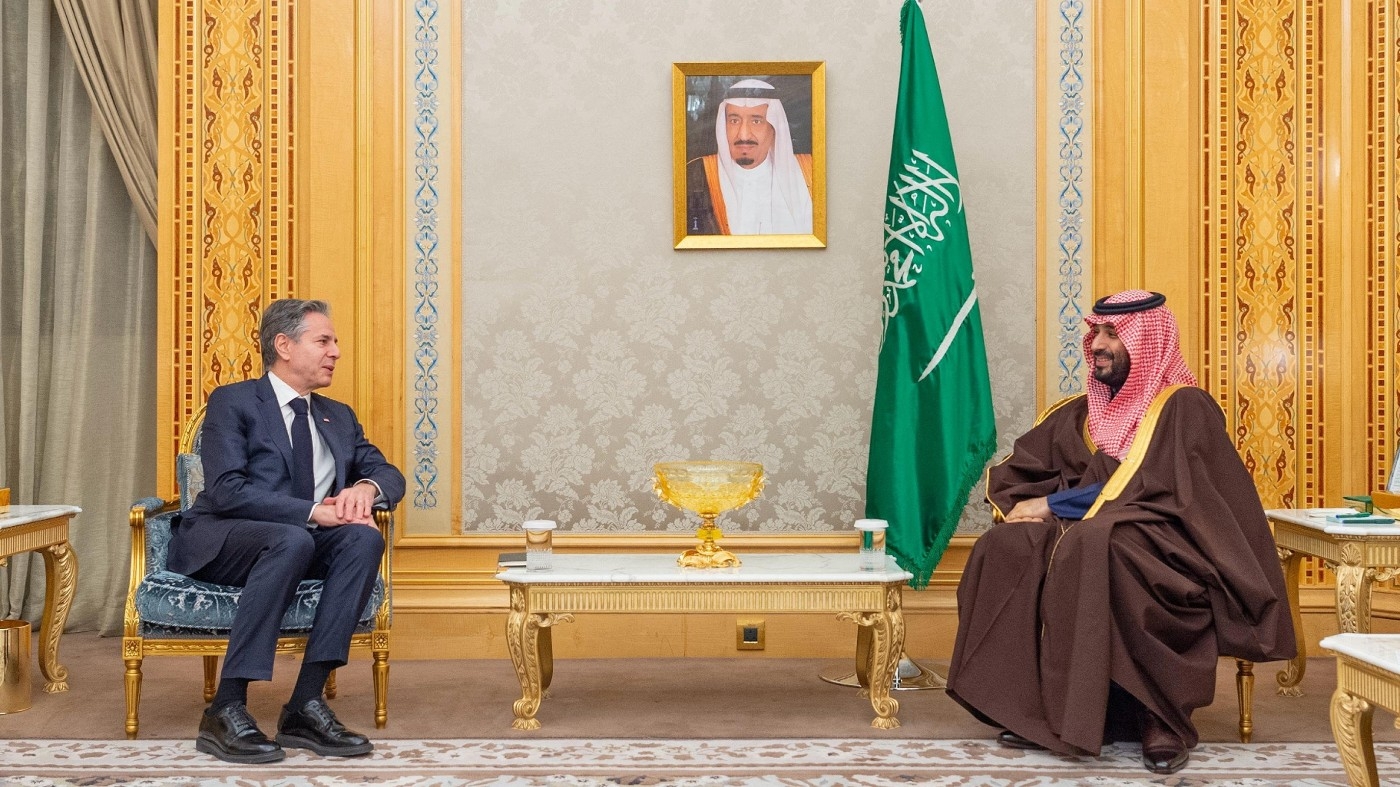
Saudi Arabia's foreign ministry poured cold water on claims it was prepared to normalise relations with Israel before a ceasefire is brokered in Gaza and without progress toward Palestinian statehood.
"The kingdom has communicated its firm position to the US administration that there will be no diplomatic relations with Israel unless an independent Palestinian state is recognised on the 1967 borders with East Jerusalem as its capital, and that the Israeli aggression on the Gaza Strip stops and all Israeli occupation forces withdraw from the Gaza Strip," the ministry said in a statement issued early on Wednesday.
The statement followed positive remarks about progress on Saudi-Israeli normalisation made by US Secretary of State Antony Blinken and US National Security Council spokesman John Kirby.
Blinken met with Saudi Arabia's crown prince, Mohammed bin Salman, in Riyadh on Monday as part of a Middle East tour that has taken in Egypt, Israel and Qatar.
New MEE newsletter: Jerusalem Dispatch
Sign up to get the latest insights and analysis on Israel-Palestine, alongside Turkey Unpacked and other MEE newsletters
At a press conference in Doha on Tuesday, Blinken said: "With regard specifically to normalisation, the crown prince reiterated Saudi Arabia's strong interest in pursuing that."
Just hours before the Saudi statement was released, Kirby said that US President Joe Biden's administration had received positive feedback regarding progress towards normalisation.
The idea of Israel and Saudi Arabia formally cementing ties has been under discussion since the Saudis gave their assent to Gulf neighbours United Arab Emirates and Bahrain establishing ties with Israel in 2020.
Several Saudi officials, including Mohammed bin Salman, have publicly acknowledged their willingness to normalise relations with Israel, even after it went to war with Gaza following the Hamas-led attacks of 7 October.
But Riyadh has publicly stressed that no deal can be reached until there is a ceasefire in Gaza and that it must include the creation of an irreversible pathway toward a Palestinian state.
While Israeli Prime Minister Benjamin Netanyahu has all but rejected a two-state solution and a large percentage of Israelis would oppose a framework based on pre-1967 lines, the Saudi statement stresses not Israeli recognition but the role of the UN Security Council.
"The kingdom reiterates its call to the permanent members of the UN Security Council that have not yet recognised the Palestinian state, to expedite the recognition of the Palestinian state on the 1967 borders, with East Jerusalem as its capital, so that the Palestinian people can obtain their legitimate rights and so that a comprehensive and just peace is achieved for all," the statement reads.
The Palestine Liberation Organisation (PLO), the umbrella organisation of the Palestinian national movement, said it supported Saudi Arabia's position.
"We thank Saudi Arabia for its firm position and efforts to stand with the Palestinian people and their just cause,” the group's secretary-general, Hussein al-Sheikh, posted on social media.
In late December, a poll conducted by the Washington Institute for Near Eastern Affairs, a pro-Israel think tank based in Washington, found that 96 percent of Saudis believe Arab countries should cut ties with Israel in response to the war on Gaza.
Hamas proposes three-stage ceasefire over 135 days
On Wednesday, several news agencies, including Middle East Eye, said they had seen the Palestinian group's proposed three-stage ceasefire plan, each lasting 45 days
All Israeli women, children under 19, the elderly and sick would be released from Gaza during the first 45-day phase in exchange for the release of all Palestinian female, children, sick and elderly prisoners over 50 years old from Israeli jails.
In addition, Israel would release 1,500 Palestinian prisoners, including 500 with life sentences.
The first stage would also see Israeli forces withdraw from populated areas of Gaza, allowing freedom of movements for Palestinians across the Gaza Strip, including the return of displaced people from south to north. Additionally, the United Nations would be permitted to set up tent encampments.
This phase would also see the cessation of all forms of air activity over Gaza, including reconnaissance, for the duration of the period.
The proposal calls for "a temporary cessation of military operations, a cessation of aerial reconnaissance, and a repositioning of Israeli forces far outside the populated areas in the entire Gaza Strip."
During the second phase, all Israeli male hostages, including soldiers, would be released for a number of Palestinian prisoner to be determined at a later time.
And in the third phase, the remains of those captives who have died would be exchanged. By the end of the third phase, Hamas would expect the sides to have reached an agreement on an end to the war.
The truce would also increase the flow of food and other aid to the embattled territory, where two million Palestinians are facing hunger and dire shortages of basic supplies.
In the draft's appendix, Hamas also called for an end to Israeli violence against Al-Aqsa Mosque, demanding a return to the mosque's pre-2002 security status.
Another request calls for the "resumption of all the humanitarian services offered to the population, all over the Gaza Strip, by the United Nations and its agencies, particularly Unrwa."
Unrwa is a crucial lifeline for the Palestinian people and supports some six million refugees who live within and outside of the occupied territories.
Founded 75 years ago, it provides direct assistance to the Palestinians, such as schooling, primary health care and other social services.
But, in recent weeks, Israeli officials have repeatedly sought to discredit the organisation, and alleged that 12 of the agency's more than 13,000 staff in Gaza were involved in the 7 October attacks on southern Israel.
Leading nations including the US, UK, Germany and Japan withdrew their financial support to the organisation last week, but according to a dossier obtained by MEE, which is just six pages long, Israel failed to provide any evidence that the 12 men were members of Hamas or other armed groups, or mention what role they may have played in the 7 October attacks.
Middle East Eye delivers independent and unrivalled coverage and analysis of the Middle East, North Africa and beyond. To learn more about republishing this content and the associated fees, please fill out this form. More about MEE can be found here.


